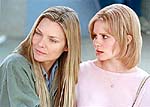White Oleander
 for mature thematic elements concerning dysfunctional relationships, drug content, language, sexuality and violence.
for mature thematic elements concerning dysfunctional relationships, drug content, language, sexuality and violence.
Reviewed by: Megan Basham
CONTRIBUTOR
| Moral Rating: | Extremely Offensive |
| Moviemaking Quality: |
|
| Primary Audience: | Teens Adults |
| Genre: | Drama |
| Length: | 1 hr. 49 min. |
| Year of Release: | 2002 |
| USA Release: |

| Featuring |
|---|
| Michelle Pfeiffer, Alison Lohman, Patrick Fugit, Noah Wyle, Robin Wright |
| Director |
|
Peter Kosminsky |
| Producer |
| John Wells, Hunt Lowry |
| Distributor |
Like the poisonous flower of the title, Astrid Magnussen’s mother, Ingrid, is an ethereal artist whose beauty belies the danger lurking beneath her skin. As brilliant as she is striking, her intellectual maneuvering convinces everyone she is a misunderstood freethinker, everyone except the person she is most trying to convince-her daughter. Though she idolizes her at first, Ingrid’s manipulations increasingly reveal to Astrid what her mother truly is: a selfish, calculating con artist willing to murder to protect her carefully constructed self image.
Early in the film, Ingrid violates her own rules and becomes attached to a Don Juan who promptly tosses her aside for another conquest. As Ingrid puts it, “He made love to me then said I had to leave because he had a date.” Bitter that he has crushed her femme fatale persona, Ingrid strikes back, landing her in the penitentiary and Astrid in a series of foster homes. However, even time and space cannot lessen the emotional vise in which Ingrid holds her daughter, and with each new foster mother, Astrid struggles to find an identity free from her mother’s influence.
Michelle Pfeiffer turns in a riveting performance as the murderous mother. No less than Medea, she psychologically devours her daughter in her desperation to appear strong and independent. Pfeiffer is perfectly cast. For the first time in years, she has chosen a role her phenomenal beauty supports rather than undermines. Though Astrid (Alison Lohman) spends the most time on screen, Ingrid is clearly White Oleander’s linchpin. With everything she does, Ingrid whispers to her daughter that her beauty and intelligence make her superior to other women—and compared to the sad, simple ladies Astrid encounters, she is.
Robin Wright Penn’s alcoholic-stripper-turned-evangelist is the first surrogate mother we meet. But don’t expect to get a picture of true redemption here. Instead, she is portrayed as a jealous, oversexed hypocrite. While proclaiming how Jesus changed her life through one side of her mouth, she threatens Astrid to stay away from her boyfriend (whom she is still having sex with) through the other. The church she attends is not much better, considering they baptize Astrid even though it is clear she was pressured into a profession of faith. Such incoherent Christianity would certainly seem less desirable than the strong, but lonely autonomy offered by Michelle Pfeiffer, and I couldn’t help but feel this is precisely Director Peter Kosminsky’s intention. “White Oleander” doesn’t even consider what would happen if Astrid was taken in by Christians of mature, deeply informed faith—it seems Kosminsky refuses to recognize such people exist.
Originally, “White Oleander” was an Oprah-anointed novel. And I have to assume more is shared in the book than in the film. Major questions are posed throughout the movie that are never fully addressed. Does Ingrid kill because “hell hath no fury” or is there, as is alluded to, some other purpose behind her homicide? Does Astrid have a physical relationship with a sympathetic foster father, or is it simply the maniacal Christian stripper’s imagination? Had the movie cut the last foster home entirely (which developed nothing in the way of story or character and was apparently included only to allow Astrid another hairstyle), and invested that time into addressing these issues, White Oleander would have been much more satisfying.
The PG-13 rating is a complete farce. Not only is harsh language, violence, and drug use present, the film also includes an auditory sex scene that is about as explicit as I have ever heard. We went to the see it with a large group of married friends, and it was still incredibly uncomfortable to sit through together. Overall, the acting was first-rate and the story somewhat engaging, but I was offended enough by the cunning Christian bashing that, had I not been there to write a review, I would have swallowed my 14 dollars and walked out.


A dark, plodding and predictable drama populated with bitter cynics and religious hypocrites. The movie tries desperately in the end to find some redeeming good in the main characters, but by then it’s too late. The film portrays Christians as self-centered hypocrites, no better than the deeply scarred people around them.

My Ratings: [Better than Average / 4½]